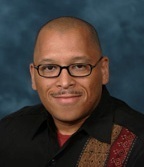
Darren Davis, professor of political science, wants to know what you really think about political candidates and public policy issues. Not necessarily what you tell the pollster—he knows the person who’s asking and the way he or she asks can shape your response—but what you actually believe.
If you’re surprised that there might be a difference, Davis understands. Pollsters and pundits present public opinion findings as authoritative truth, but he’s quick to counter: “All data are guilty until proven innocent.”
That simple challenge to today’s political coverage is why Davis is in high demand—writing books, serving on national political science committees, and appearing in various media outlets. It’s why he screens calls, declines some work offers, and rations sleep.
Davis draws inspiration from the muckraking approach of Upton Sinclair, whose work, The Jungle, exposed public health abuses that plagued the American meatpacking industry in the early 20th century.
“You couldn’t eat sausage after that,” he says. “Public opinion is pretty much the same way. The way pollsters process it, sometimes it is like sausage-making. It’s quick. And sometimes you don’t want to know what goes into it.”
Context matters
A poll, Davis argues, represents a complex set of ingredients. There are the better-known ones—the questions asked, the sample size, the medium used—but there are less obvious ones that interest him, like who asked the questions and how the person framed them.
For instance, people who say they support religious freedom when asked a general question may react differently if asked what they think about the expression of fundamentalist religious beliefs in a post-9/11 era. Context matters.
So does the interviewer. A white person is more likely to say he or she supports a black candidate like Barack Obama if the pollster is black, Davis says. Even the amount of time people are allowed before answering a question matters—the more time, the more likely they are to provide a socially acceptable answer.
“I think my research has tremendous implications for analyzing public opinion,” Davis says. “I think other scholars have tried to apply the same idea that all data are guilty until proven innocent. I have shown how the most fundamental statistics have been influenced by the methodology.”
Improving the process
Davis continually juggles projects. He’s currently at work on Afterthought, a book that offers a statistical critique of political science’s failure to account for race. He’s also partnering with the Department of Psychology to set up virtual interviews that will simulate public opinion interviews in a controlled laboratory environment.
In addition, Davis continues to explore the issues of tolerance and civil liberties that he examined in his earlier work Negative Liberty: Public Opinion and the Terrorist Attacks on America. He wants to develop a reliable measure of public support for democracy. That, he says, means quantifying support for such democratic traditions as representation, freedom of speech and religion, and the rights of the accused. His goal is to develop an indicator that is for political science what the Consumer Price Index is for economics.
Davis sees his work as flowing from a broader Catholic focus on social issues. He cites the opportunity to do such research as a major factor that drew him to Notre Dame.
“I’m intrigued by the Catholic nature of the research we do here,” he says, “and the social justice emphasis of our research.”


